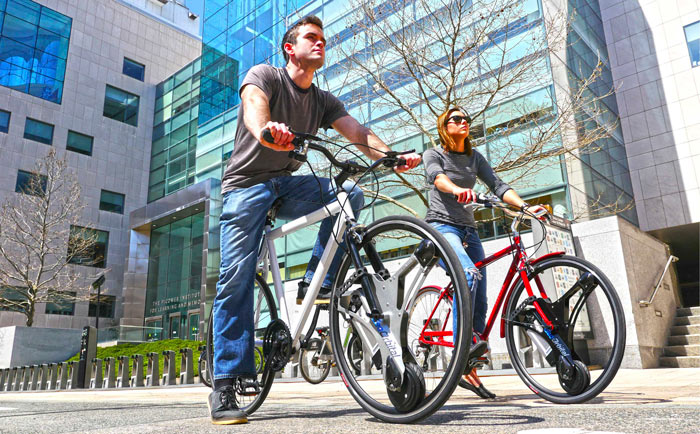After launching one of the most successful crowdfunding campaigns on Kickstarter ever last year, GeoOrbital, a Boston-based startup that manufacturers wheels that can make any bike electric in 60 seconds or less, is raising a batch of fresh funds from individual investors through StartEngine, an equity crowdfunding platform.
At the helm of GeoOrbital is founder and CEO Michael Burtov, a serial entrepreneur who first thought of creating an electric-powered bike wheel while he was watching the movie Tron: Legacy.
While Burtov isn't ruling out seeking out more traditional sources of financing in the future, for now, he's tapping the crowd for funding. He was asked why he prefers to rely on crowdsourced funding and how this approach fits into GeoOrbital's brand-building strategy.
What sources of funding did you tap into when you were just getting started?
Michael Burtov: For two years we were building prototypes. We were completely bootstrapped, which is very different from most hardware companies. A lot of companies begin the R&D phase with significant money in the bank. But on our end we didn't really have anything. There was no money to pay people or even for R&D. We were all held together by the love for the idea. We surrounded ourselves with people who shared our vision for the future, and were not just in it for a paycheck. This wasn't a "strategy"; it was the only way that we could get off the ground, and it was critical to our success.
From my experience, in founding three companies before this one, being an early stage company with access to capital can be one of the biggest problems that a company can have. When you have money you don't have the same "fire in your belly" to succeed, and the people you hire are just that: they are hires, they are not believers. They are not putting as much into building the idea and the company. It is just the opposite, they take money out it.
I'm happy that we didn't really have any external funding for almost two years. It taught us to be lean, to surround ourselves with awesome people, and to really focus on what's important--not to us--but to our customers.
After a couple of years and several generations of prototypes, we did raise a little angel money. We found a few awesome investors who believed in us and helped us along the way, but it was very small money.
After bootstrapping your company, you then launched a very successful Kickstarter campaign.
Michael Burtov: Yes. Having honed our product and team we launched a Kickstarter campaign in May 2016. We blew it out of the water. It was a massive success. In just 45 days, we raised over $1.26 million from more than 1,600 backers, and we sold over 1,400 wheels. The campaign put GeoOrbital in the top .05% of all crowdfunding in terms of capital raised.
What did you do differently to make your Kickstarter launch such a big success?
Michael Burtov: I think you have to be genuine. I like to say that if you are yourself, you'll alienate 99 out of 100 people. But if you get that 1 person out of 100 believing in and buying your stuff, you'll have a massively successful company.
I'm not afraid to be myself. With our social media presence, with how we communicate, we're very genuine about who we are. Being genuine to us is saying that I don't think people want to control the speed of their bicycle using an app on their phone.
If you look at the crowdfunding space today, or what investors like, or what experts would tell you to do, they all tell you that you have to connect your thing to the internet. Whether it's a cup or a knife or an oven or a car or whatever appliance you're trying to sell, it needs to be internet connected, they say. Otherwise, you're not talked about in the same way as high tech, high growth companies, which is what we are.
I'm trying to figure out what people want. Not what I want to sell them, but what people actually want. That process has led us as a company to make unorthodox decisions. We alienated a lot of people that wanted an app, but we appealed to that 1% that didn't want an app.
We really can't afford to ignore our customers because we are effectively funded by them.

What else did you do on social media to support your Kickstarter launch?
Michael Burtov: We don't hold onto ownership of our own content. We'll put something out there and let others use it however they like. We don't tag it, we don't say it's ours. We just let everyone use it.
For example, a few days into our Kickstarter campaign, Tech Insider took a video we had produced and shared in our media kit, added some titles and music, and posted it on their Facebook page. It went immediately viral, and to-date has attracted over 26 million views, nearly 150,000 reactions, and almost half a million social shares. That gave our campaign a really big boost.
You've recently launched an equity crowdfunding campaign. How is equity crowdfunding different than crowdfunding on Kickstarter?
Michael Burtov: Equity crowdfunding is an actual investment. Investors are not buying products, they are buying a part of the company. The type of equity crowdfunding that we are doing was introduced as part of the JOBS Act and only took effect about a year ago. Only a handful of companies have done it before. It is extremely disruptive to the traditional venture capital model.
Until now only accredited investors could invest in early stage companies. Now everyone can do it. Imagine being able to invest in Facebook or Twitter when they were just start-ups? The accredited investors who made investments in companies like this made crazy money, and until now regular folk were not allowed to invest at all. Equity crowdfunding is the great equalizer. If a company chooses to do it, like we have, everyone is able to invest in it, not just elite investors. It takes a lot of power out of the hands of the big funds and groups and allows everyone to invest, and hopefully profit, from a company's growth.
From my perspective, raising actual growth capital from the crowd is a radically different way to run a company. It's very transparent, much more transparent than any traditional start-up company wants to be.
We publicly disclose everything from our financials to our competitors to all our weaknesses and submit it all to the SEC. All the good, the bad, and the ugly about us are out there for the world to see. There is no spinning numbers or keeping secrets like some companies do.
Most companies that have revenues or traction like us would probably not go through this because there's this perception of losing competitive advantage by disclosing sensitive information about yourself. But I disagree. I think that the benefit we get from building the brand and the company far outweighs the cost.
And, frankly, I believe that in this day and age it's critical for brands to be honest and transparent. Like anything new and groundbreaking, equity crowdfunding is also very controversial.
There are a lot of people telling me to not do this, but I think it's a great way to crowdsource a company's growth.
Thanks for reading
Hi! I am a robot. I just upvoted you! I found similar content that readers might be interested in:
https://www.inc.com/glenn-leibowitz/how-this-elebike-startup-launched-one-of-the-most-successful-kickstarter-campaig.html
Downvoting a post can decrease pending rewards and make it less visible. Common reasons:
Submit
@solextin
Good content
Keep sharing good posts!
Downvoting a post can decrease pending rewards and make it less visible. Common reasons:
Submit